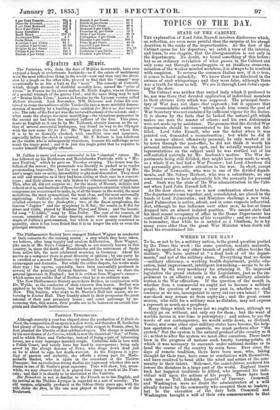TOPICS OF THE DAY.
STATE OF THE CABINET.
THE explanation of Lord John Russell involves disclosures which, on reflection, are even more painful than the surprise at his abrupt desertion to the ranks of the impracticables. As the door of the Cabinet opens for his departure, we catch a view of the interior, and learn, to our chagrin, that the disorganization is not only in the departments. No doubt, we heard something of this before ; but as an ordinary revelation of what passes in the Cabinet can only come out through eavesdroppers or an insidious cross-exa- mination of the weaker-minded members, it is always to be received with suspicion. To reverse the common Italian saw, if it is true, it comes to hand unluckily. We knew there was falsehood in the animus of such whisperings ; and they were false, although there was a truth for them to tell. We see it through Lord John's open- ing of the door.
The Cabinet was neither that united body which it professed to be, nor was there that devoted application of individual members to their obvious duty which was supposed. The principal Secre- tary of War does not share that reproach ; but it appears that the "commendable ambition" which made him retain the post of War Secretary was not sustained by sufficient vigour for the duties. It is shown by the facts that he lacked the natural gift which makes one man the master of others; and his own deficiencies were not made up by assistance. The promise that the divided War departments should be concentrated to his hand was not ful- filled. Lord John Russell, who saw the defect when it was pointed out, demanded a reconstruction ; but while he did it in a manner almost offensively personal, he only worked at it by notes through the post-office, he did not think it worth his personal attendance on the spot, and he actually suspended his representations on the subject until he was startled out of his self-satisfied quietude by Mr. Roebuck's motion. The War de- partments being still divided, they might have been made to work as a whole if we had had a War Premier ; but Lord Aberdeen did not personally give active attention to the war. In short, except the Duke of Newcastle, who was in one of the divided depart- ments, and Mr. Sidney Herbert, who was a subordinate, no one concerned seems to have adequately felt the necessity for personal zeal. Such was the state of the War administration in the Cabi- net when Lord John Russell left it.
As the door closes, we see a new combination about to form. The departments come together, and, consolidated, are placed in the hands of Lord Palmerston ; and Ministers challenge a new trial. Lord Palmerston is active, adroit, and in some respects influential. But, although he has influence over other men, he has at times dropped into an almost isolated position. We cannot state that his most recent occupancy of office in the Home Department has confirmed all the expectation of his versatility ; and we are forced to remember, that while he is untried as a Chatham, he is by many years older than the great War Minister when death out short his overstrained life.


































 Previous page
Previous page